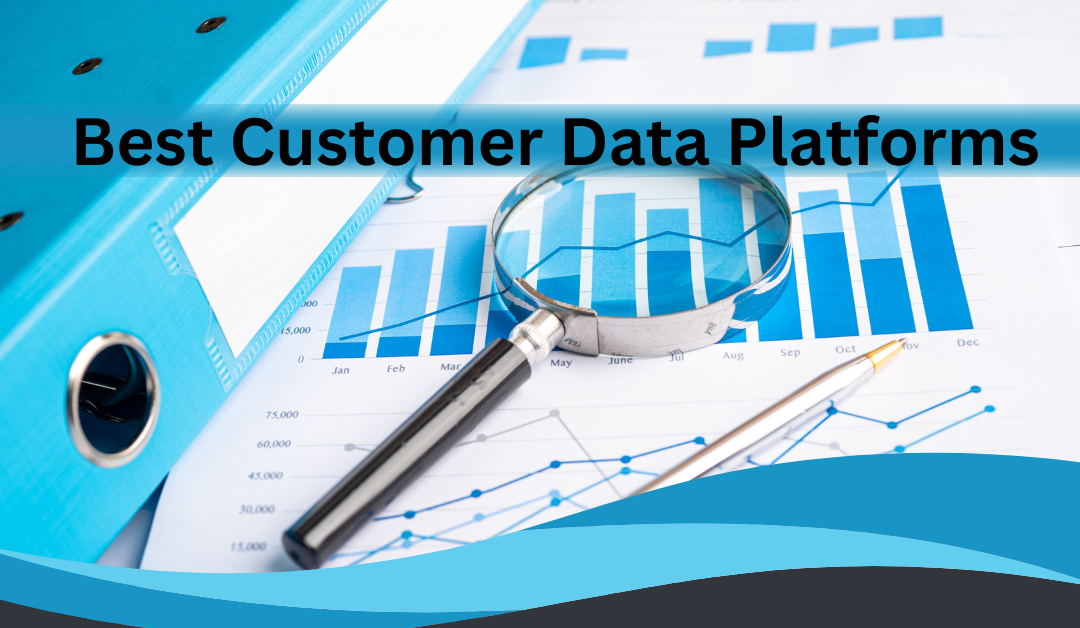Customer Data Platforms (CDPs) are pivotal in today’s data-driven business landscape. They are instrumental in collecting, organizing, and harnessing customer information, empowering companies to provide personalized experiences, boost customer satisfaction, and enhance their marketing strategies. This article will explore three of the best CDPs, each renowned for its unique features and capabilities.
Salesforce Customer 360
Salesforce Customer 360, a powerhouse in the CDP realm, offers a comprehensive suite of tools for customer data management. Its robust data integration capabilities connect customer information from various touchpoints, enabling businesses to gain a holistic view of their customers. This CDP excels in unifying data and delivering a 360-degree customer view, facilitating more effective marketing and sales strategies.
Adobe Real-Time CDP
Adobe’s Real-Time CDP distinguishes itself by emphasizing real-time data processing and personalization. It can process and analyze vast amounts of data at lightning speed, allowing companies to respond to customer behaviour in real time and optimize content and offers. Moreover, its AI-powered features enable predictive analytics, enhancing customer engagement and driving higher conversion rates.
Segment
Segment is a CDP renowned for its simplicity and flexibility. It provides a user-friendly interface that empowers businesses to gather, organize, and activate customer data without extensive technical expertise. With a wide range of integrations, Segment easily connects with popular marketing tools, helping businesses create customized customer experiences and effectively target audiences.
In conclusion, Customer Data Platforms (CDPs) are pivotal in today’s data-driven business landscape. They are instrumental in collecting, organizing, and harnessing customer information, empowering companies to provide personalized experiences, boost customer satisfaction, and enhance their marketing strategies. This article will explore three of the best CDPs, each renowned for its unique features and capabilities.
List Of the Top10 Customer Data Platforms
Customer Data Platforms (CDPs) are pivotal in helping businesses better understand and engage with their customers. They empower companies to collect, analyze, and leverage customer data to enhance marketing, customer service, and overall business strategies. In this article, we’ll introduce the ten best CDPs, each with a one-line description to help you make an informed decision.
List here:
1. Salesforce Customer 360: This is a robust CDP with real-time data integration capabilities.
2. Segment: Segment is a versatile CDP that unifies customer data across various platforms.
3. Adobe Real-Time CDP: This is an enterprise-grade platform for data management.
4. BlueConic: BlueConic offers AI-powered customer insights and personalized marketing solutions.
5. Exponea: Exponea is an all-in-one customer data platform for e-commerce.
6. Optimizely (Episerver): Optimizely CDP offers experimentation and personalization features.
7. Lytics: Lytics helps businesses create personalized customer experiences through data insights.
8. Amperity: Amperity provides a scalable CDP with machine learning-driven insights.
9. Treasure Data: Treasure Data is a cloud-based CDP for data integration.
10. BlueVenn: BlueVenn is a CDP with advanced analytics and marketing automation.
Furthermore:
These CDPs are well-suited for businesses of various sizes and industries, each offering unique features to meet specific data management and customer engagement needs. Whether you’re a small startup or a large enterprise, selecting the right CDP can be a game-changer in improving customer relationships and achieving business growth.
Evaluate your specific requirements and objectives before choosing the one that best fits your organization. A CDP can provide valuable insights into customer behaviour, streamline marketing efforts, and boost customer satisfaction and loyalty.
Reviews Of Best Customer Data Platforms
Customer Data Platforms (CDPs) have become indispensable tools for modern businesses seeking a competitive edge. These platforms enable organizations to aggregate, analyze, and utilize customer data in previously unimaginable ways. CDPs offer many advantages, from enhancing customer experiences to optimizing marketing strategies and ensuring compliance with data privacy regulations.
Firstly, CDPs empower companies to harness the full potential of their customer data. By centralizing and unifying data from various sources, businesses can create a comprehensive and 360-degree view of their customers. This single customer view allows a deeper understanding of customer behaviour, preferences, and demographics.
Secondly, improved customer experiences are a prominent benefit of CDPs. With a unified customer profile, companies can provide personalized interactions, tailoring product recommendations, content, and communications. This personalization enhances customer engagement and loyalty.
Thirdly, CDPs facilitate the optimization of marketing efforts. Businesses can target their marketing campaigns more effectively by segmenting customers based on their characteristics and behaviours. It leads to higher conversion rates, reduced marketing costs, and improved return on investment.
Moreover, CDPs play a crucial role in enhancing data security and compliance. With the increasing importance of data privacy regulations like GDPR and CCPA, CDPs enable organizations to manage customer data precisely, ensuring that they adhere to legal requirements while safeguarding customer trust.
Additionally:
CDPs streamline data integration and processing. These platforms automate the collection and consolidation of data, reducing manual data entry errors and saving time for data engineers and analysts. This efficiency allows businesses to respond more rapidly to market changes and customer demands.
Moreover, CDPs provide a foundation for data-driven decision-making. By offering easy-to-understand reports and dashboards, these platforms empower executives and managers to make informed choices that drive business success.
Lastly, CDPs are scalable and adaptable to the unique needs of each business. Whether a company is a small startup or a global enterprise, CDPs can be tailored to fit their specific requirements, making them a valuable asset for organizations of all sizes.
In conclusion, Customer Data Platforms offer many advantages, making them an invaluable resource for businesses seeking to thrive in the digital age. These platforms enable data-driven decision-making, enhance customer experiences, optimize marketing strategies, and ensure data security and compliance. With their flexibility and adaptability, CDPs are poised to continue revolutionizing how companies interact with customers and manage their data.
Salesforce Customer 360
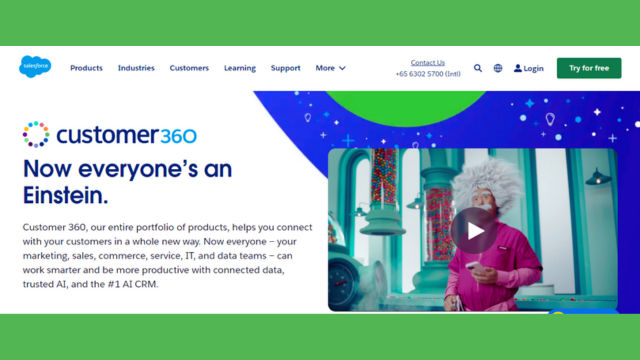
Salesforce Customer 360 is a comprehensive solution that empowers businesses to streamline and enhance customer relationship management. It offers a myriad of advantages that can significantly benefit organizations. Let’s delve into the five critical pros of Salesforce Customer 360.
360-Degree Customer View:
Salesforce Customer 360 provides a holistic view of customer interactions, including their history, preferences, and purchase patterns, enabling businesses to personalize their interactions and drive customer loyalty effectively.
Unified Data Management:
It consolidates customer data from various sources into a single, unified platform, ensuring data accuracy and consistency, which is crucial for making informed decisions and strategizing effectively.
Seamless Integration:
Salesforce Customer 360 seamlessly integrates with other Salesforce products and third-party applications, making it a versatile tool that can adapt to a company’s unique requirements and existing technology stack.
Automation and Workflow:
This solution offers robust automation and workflow capabilities, allowing businesses to automate routine tasks, streamline processes, and improve overall efficiency, reducing manual workload and human error.
Scalability:
Salesforce Customer 360 is highly scalable, making it suitable for businesses of all sizes. It can grow with your organization and adapt to evolving customer demands, ensuring long-term relevance.
In summary, Salesforce Customer 360 is a dynamic CRM solution that delivers a 360-degree view of customers, streamlines data management, integrates seamlessly, automates workflows, and scales to meet businesses’ evolving needs. These pros make it a valuable asset for any organization looking to enhance customer relationship management and stay competitive in a dynamic market.
Pros
1. Comprehensive customer data unification for personalized marketing and service.
2. Enhanced customer journey tracking and analytics for data-driven decision-making.
3. Seamless integration with Salesforce CRM and third-party applications.
4. Scalable and adaptable to evolving business needs for long-term value.
Cons
1. Complex setup and configuration may require expertise.
2. High costs, particularly for smaller businesses.
3. Limited support for non-Salesforce data sources.
4. Potential for data privacy and security concerns if not managed properly.
Segment
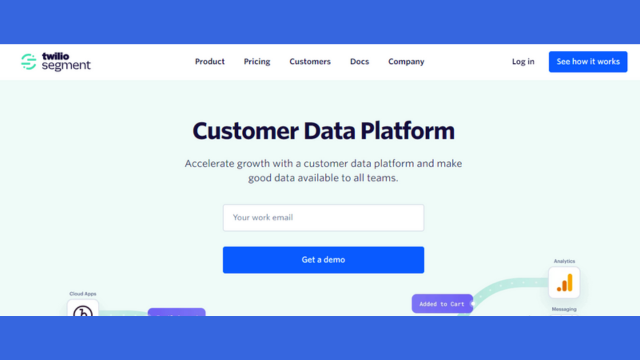
Customer data platforms (CDPs) have become a crucial tool for businesses in today’s data-driven world. Segment is recognized as one of the best CDPs, offering many features and benefits to help companies manage their customer data effectively. Here are five key advantages of using Segment as a CDP:
Data Centralization:
Segment allows businesses to aggregate customer data from various sources, including websites, mobile apps, and third-party integrations. This centralization simplifies data management and ensures a single source of truth.
Real-time Data Processing:
Segment excels at processing real-time data, enabling businesses to access up-to-the-minute insights into customer behaviour and preferences. It empowers companies to make informed decisions promptly.
User Segmentation:
Segment offers robust segmentation capabilities, enabling businesses to create highly targeted customer segments. It helps deliver personalized content and marketing messages, improving engagement and conversions.
Integration Flexibility:
Segment integrates seamlessly with various third-party tools and platforms. This flexibility allows businesses to connect multiple marketing, analytics, and customer support tools, creating a unified ecosystem.
Compliance and Security:
Segment prioritizes data security and compliance with regulations such as GDPR and CCPA. It offers anonymization and encryption, helping businesses maintain the highest data protection and privacy standards.
In conclusion, Segment stands out as a top-notch CDP due to its ability to centralize data, process it in real-time, segment customers effectively, integrate with diverse tools, and prioritize data security and compliance. Utilizing Segment can significantly enhance a company’s ability to harness customer data for strategic decision-making and deliver exceptional customer experiences.
Pros:
1. Streamlines data collection, improving marketing and analytics efficiency.
2. Enables precise audience segmentation for targeted campaigns and personalization.
3. Integrates with numerous third-party tools, enhancing flexibility and functionality.
4. Facilitates data governance and compliance, ensuring data security and privacy.
Cons:
1. Costs can escalate with increased data volumes and feature usage.
2. Complex setup and configuration may require expertise and time investment.
3. Reliance on third-party integrations can introduce potential data vulnerabilities.
4. Limited built-in analytics and reporting capabilities may require additional tools.
Adobe
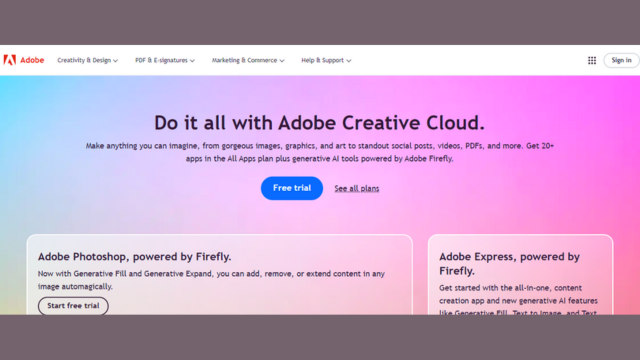
Adobe Real-Time Customer Data Platform (CDP) is a leading solution in customer data management. This platform offers many advantages, making it a top choice for businesses looking to optimize their customer data strategies. Here are five critical pros of Adobe Real-Time CDP:
1. Real-Time Data Processing:
Adobe Real-Time CDP excels in processing customer data instantaneously. This real-time capability enables businesses to make quick and informed decisions based on the most up-to-date information, enhancing customer engagement and personalization.
2. 360-Degree Customer View:
Adobe’s CDP aggregates data from multiple sources, providing a comprehensive view of each customer. This holistic perspective empowers businesses to better understand their customer’s preferences, behaviours, and needs, enabling more effective targeting and marketing.
3. Seamless Data Integration:
One of Adobe Real-Time CDP’s significant strengths is its ability to integrate seamlessly with various data sources and systems. It ensures that businesses can harness all their data resources, enhancing the accuracy and completeness of customer profiles.
4. Advanced Segmentation:
Adobe Real-Time CDP offers advanced segmentation capabilities, allowing businesses to create particular customer segments. Precision is invaluable for targeted marketing campaigns and personalization efforts, increasing customer satisfaction and loyalty.
5. Data Privacy and Compliance:
Adobe strongly emphasizes privacy and compliance. Its CDP is designed to adhere to data protection regulations, providing peace of mind to businesses and customers alike. This commitment to data security builds trust and credibility with customers.
In summary, Adobe Real-Time CDP offers a powerful and versatile solution for businesses seeking to leverage customer data effectively. Real-time data processing, a 360-degree customer view, seamless data integration, advanced segmentation, and a strong focus on data privacy equips businesses with the tools they need to thrive in today’s data-driven world.
Pros :
1. Offers real-time data insights for instant decision-making and personalization.
2. Seamlessly integrates with Adobe’s marketing tools for comprehensive customer engagement.
3. Provides a unified view of customer data across channels and touchpoints.
4. Enhanced security measures safeguard sensitive customer information effectively.
Cons:
1. High implementation and subscription costs may be prohibitive for smaller businesses.
2. Complex setup and configuration require skilled personnel for effective utilization.
3. Integration with non-Adobe applications may pose challenges and compatibility issues.
4. Ongoing maintenance demands resources and expertise for optimal performance.
BlueConica’s
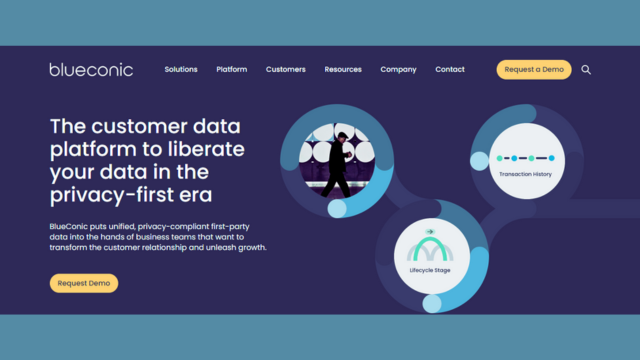
BlueConica’s Customer Data Platform (CDP) is a powerful solution for businesses seeking to optimize customer data management and engagement strategies. Here are five key advantages that set BlueConica’s CDP apart:
Enhanced Customer Insights:
BlueConica’s CDP leverages advanced analytics and machine learning to provide businesses with real-time customer insights. It helps companies understand customer behaviour, preferences, and purchasing patterns, enabling data-driven decision-making.
Seamless Data Integration:
BlueConica’s CDP integrates various data sources, including CRM, e-commerce, and marketing systems. It ensures that all customer data is consolidated and accessible in one centralized platform, eliminating data silos.
Personalized Customer Experiences:
With its robust segmentation and personalization capabilities, BlueConica’s CDP enables businesses to deliver highly targeted and relevant content to customers. This results in improved customer engagement and higher conversion rates.
Data Privacy and Compliance:
BlueConica’s CDP prioritizes data security and compliance. It adheres to global data protection regulations, providing businesses with the peace of mind that customer data is handled ethically and by legal requirements.
Scalability and Flexibility:
BlueConica’s CDP is designed to grow with your business. It offers scalability and flexibility, allowing companies to adapt to changing customer needs and market dynamics. It means that your CDP can evolve alongside your organization.
In conclusion, BlueConica’s Customer Data Platform empowers businesses to harness the full potential of their customer data. With enhanced insights, seamless data integration, personalized customer experiences, data privacy, and scalability, it’s a comprehensive solution that can drive growth and success in today’s data-driven business landscape.
Pros:
1. BlueConica streamlines customer data for improved marketing personalization and insights.
2. It offers a unified view of customer information, enhancing data consistency.
3. BlueConica supports real-time data updates, enabling timely marketing actions.
4. Its user-friendly interface facilitates easier data management and segmentation.
Cons:
1. Implementation and integration may require technical expertise and resources.
2. Costs can escalate as the database size and usage increase.
3. Limited third-party integrations may hinder broader ecosystem compatibility.
4. Data security and privacy concerns need careful consideration and management.
Exponea
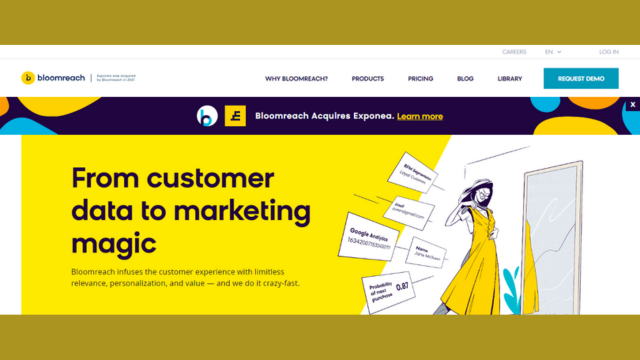
Exponea is a leading customer data platform renowned for its exceptional capabilities. Its robust features and functionalities empower businesses to elevate customer experiences and drive growth. Here are five key advantages of Exponea as one of the best customer data platforms:
Data Unification:
Exponea excels at collecting and consolidating customer data from multiple sources. This unified data repository gives businesses a comprehensive view of their customers, which is vital for making informed decisions.
Advanced Analytics:
Exponea provides powerful analytics tools that allow businesses to gain valuable insights from their customer data. These include predictive analytics, segmentation, and customer behavior analysis, which help companies tailor their strategies effectively.
Personalization:
Exponea offers advanced personalization capabilities, enabling businesses to deliver highly targeted and relevant content to their customers. It leads to improved customer engagement and higher conversion rates.
Marketing Automation:
Exponea’s automation features allow businesses to streamline their marketing campaigns. From email marketing to multichannel automation, it helps save time and resources while delivering more impactful marketing efforts.
Real-time Data:
Exponea provides real-time customer data, ensuring that businesses can respond promptly to customer interactions and events. This real-time insight helps in delivering timely and contextually relevant messages to customers.
In conclusion, Exponea stands out as a robust customer data platform that empowers businesses to harness the full potential of their customer data. With data unification, advanced analytics, personalization, marketing automation, and real-time data capabilities, it is a top choice for companies looking to enhance their customer experiences and drive growth.
Pros:
1. Exponea offers robust customer data integration for comprehensive insights.
2. Its personalized marketing tools enhance customer engagement and retention.
3. Real-time data tracking aids in immediate decision-making for marketing strategies.
4. Exponea’s user-friendly interface simplifies data analysis and campaign management.
Cons:
1. Exponea can be costly, limiting accessibility for small businesses.
2. Complex features may require significant training for effective utilization.
3. Integration with other software can be challenging, leading to potential complications.
4. Some users report occasional technical glitches affecting data accuracy.
Optimizely
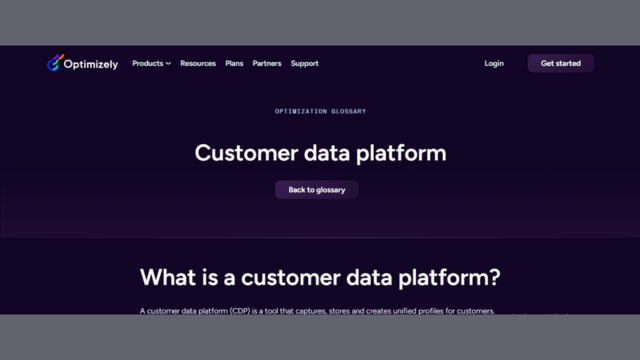
Optimizely, now known as Episerver, is a robust customer data platform (CDP) that offers numerous benefits to businesses seeking to optimize their customer data management. In active voice, we can highlight the following five pros of using Optimizely as a CDP:
Comprehensive Data Integration:
Optimizely integrates with various data sources, allowing businesses to consolidate and centralize customer data from different touchpoints, such as websites, mobile apps, and offline interactions. This integration ensures businesses have a holistic view of their customers’ interactions and preferences.
Personalized Customer Experiences:
With Optimizely, businesses can create highly personalized customer experiences. Its advanced AI and machine learning capabilities enable the delivery of tailored content and recommendations, enhancing user engagement and satisfaction.
Real-time Data Insights:
Optimizely provides real-time data insights, enabling businesses to make informed decisions promptly. These insights help understand customer behaviour, monitor campaign performance, and adapt strategies on the fly for maximum impact.
Scalability:
Whether you’re a small startup or a large enterprise, Optimizely is designed to scale with your business. It can handle vast amounts of customer data and adapt to your organization’s evolving needs, making it a versatile solution.
Security and Compliance:
Optimizely strongly emphasizes data security and compliance. It adheres to industry standards and regulations, ensuring that customer data is protected and that businesses comply with privacy laws.
In summary, Optimizely, now Episerver, offers a powerful customer data platform that empowers businesses to harness the full potential of their customer data. Its data integration capabilities, personalization features, real-time insights, scalability, and commitment to security and compliance make it a valuable asset for businesses looking to enhance customer relationships and drive success.
Pros:
1. Enhances personalized customer experiences through data-driven insights and testing.
2. Simplifies data integration and analysis, streamlining decision-making processes.
3. Offers robust A/B testing and experimentation tools for optimizing marketing strategies.
4. Provides a scalable and flexible platform to adapt to changing business needs.
Cons:
1. Costly for small businesses, limiting accessibility.
2. Steeper learning curve for non-technical users in data management.
3. Integration with other tools may require additional resources and time.
4. Reliance on third-party platforms for some advanced features can be a drawback.
Lytics
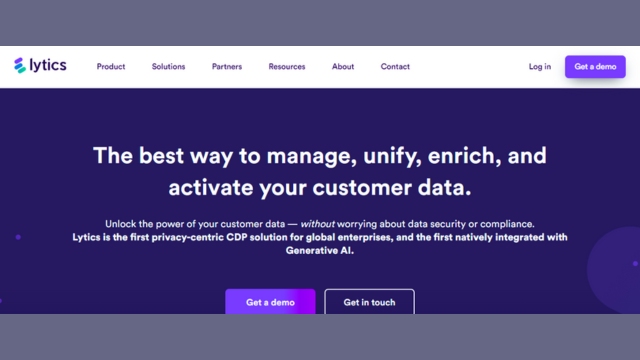
Lytics, a leading customer data platform, offers businesses various advantages. These advantages are derived from its robust features and capabilities, making it a preferred choice for organizations looking to enhance their customer data management and marketing efforts. Here are five critical pros of using Lytics:
Comprehensive Customer Data:
Lytics provides a centralized hub for collecting, organizing, and analyzing customer data from various sources, allowing businesses to gain a holistic view of their audience.
Advanced Segmentation:
With Lytics, you can create highly targeted customer segments based on demographics, behaviours, and preferences, enabling personalized and effective marketing campaigns.
Real-time Data Processing:
Lytics offers real-time data processing and customer insights, ensuring that businesses can make timely decisions and engage with customers when it matters most.
Machine Learning Capabilities:
The platform employs machine learning algorithms to predict customer behaviours, helping businesses optimize their marketing strategies and improve customer engagement.
Multichannel Integration:
Lytics integrates with various marketing channels, enabling businesses to deliver consistent and personalized messaging across email, web, social media, and more.
In conclusion, Lytics is a robust customer data platform that empowers businesses with comprehensive customer insights, advanced segmentation, real-time data processing, machine learning capabilities, and multichannel integration. These advantages enable organizations to create more effective and personalized marketing strategies, ultimately driving improved customer engagement and business growth.
Pros:
1. Lytics streamlines customer data, enhancing personalized marketing strategies.
2. Real-time data access aids agile decision-making, optimizing customer engagement.
3. Scalability supports business growth, ensuring data management efficiency.
4. Lytics’ data integration empowers cross-channel marketing, improving overall customer experience.
Cons:
1. Initial setup may be complex, requiring expert implementation.
2. High costs might deter smaller businesses from utilizing Lytics.
3. Data security concerns could arise, necessitating robust protection measures.
4. Continuous data updates and maintenance can be resource-intensive, demanding dedicated personnel.
Amperity
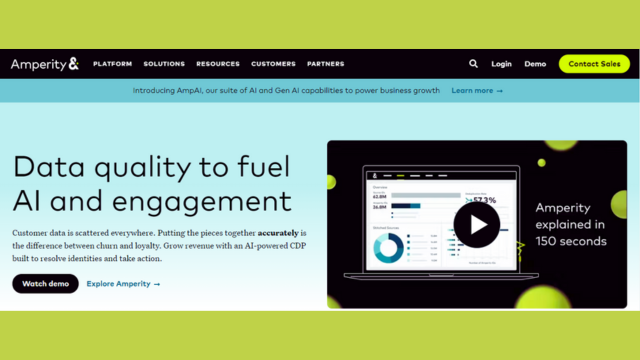
Amperity is a leading customer data platform that empowers businesses to harness the full potential of their customer data. This innovative platform offers numerous advantages, making it a top choice for organizations looking to enhance customer relationships and drive growth. Here are five critical pros of using Amperity:
Data Unification:
Amperity excels in harmonizing customer data from various sources, providing a unified and comprehensive view of each customer. It means no more fragmented or siloed data, enabling businesses to make data-driven decisions confidently.
Customer Insights:
Amperity offers advanced analytics and segmentation tools, allowing businesses to gain deep insights into customer behaviour and preferences. It empowers companies to tailor their marketing and engagement strategies with precision.
Real-time Capabilities:
With Amperity, businesses can access and analyze customer data in real time. It enables immediate responses to customer actions, ensuring timely and personalized interactions.
Scalability:
Amperity is designed to grow with your business. Whether a small startup or a large enterprise, this platform can scale to accommodate your evolving data needs, ensuring long-term relevance.
Privacy and Compliance:
Amperity strongly emphasizes data privacy and compliance, helping businesses maintain the trust of their customers. It ensures that customer data is handled securely and in accordance with relevant regulations.
In summary, Amperity’s customer data platform is a powerful tool for businesses seeking to optimize their use of customer data. Its ability to unify data, provide invaluable customer insights, operate in real-time, scale with your business, and maintain strong privacy and compliance measures make it a standout choice for companies looking to excel in today’s data-driven business landscape.
Pros:
1. Amperity streamlines data for more effective customer insights and marketing.
2. It enhances personalization, leading to higher customer engagement and loyalty.
3. Amperity offers real-time data updates, ensuring accurate, up-to-date information.
4. The platform’s flexibility allows businesses to adapt to changing customer needs.
Cons:
1. Implementation can be complex, requiring skilled personnel for setup.
2. Costs may be prohibitive for small businesses with limited budgets.
3. Integration with existing systems can pose challenges and disrupt operations.
4. Data security and privacy concerns may arise with sensitive customer information.
Treasure Data
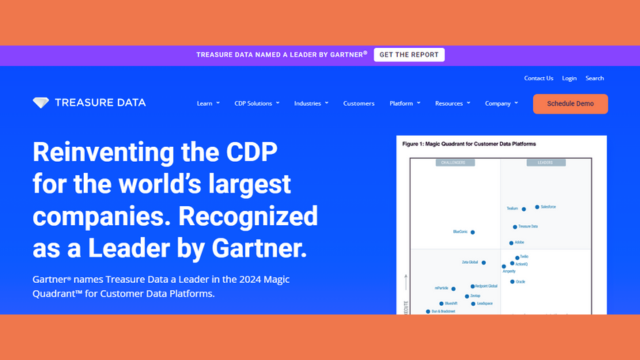
Treasure Data is a leading customer data platform offering businesses robust solutions for managing and utilizing customer data effectively. With its versatile features and capabilities, Treasure Data stands out in the crowded field of customer data platforms. Here are five key advantages of Treasure Data:
Real-time Data Collection:
Treasure Data provides real-time data collection, allowing businesses to gather and analyze customer information instantly. It ensures up-to-the-minute insights for making critical decisions.
Seamless Data Integration:
Treasure Data offers seamless integration with various data sources, enabling companies to consolidate and harmonize their data from multiple channels, such as websites, mobile apps, and IoT devices.
Advanced Analytics Tools:
The platform includes powerful analytics tools, making it easy to derive valuable insights from your customer data. These tools support predictive modelling, segmentation, and more.
Scalability:
Treasure Data is highly scalable, accommodating businesses of all sizes. Whether you’re a startup or a large enterprise, the platform can grow with your data needs.
Security and Compliance:
Treasure Data strongly emphasizes data security and compliance. It offers robust features for data protection, ensuring that customer information is handled with the utmost care and complies with relevant regulations.
In conclusion, Treasure Data excels as a customer data platform due to its real-time data collection, seamless integration capabilities, advanced analytics tools, scalability, and data security and compliance commitment. Businesses looking to harness the power of their customer data for improved decision-making and personalized customer experiences can benefit significantly from Treasure Data’s offerings.
Pros:
1. Enables data consolidation for a holistic customer view and analysis.
2. Facilitates real-time data processing and analysis for quicker insights.
3. Offers scalable cloud-based infrastructure for cost-effective operations.
4. Provides user-friendly dashboards for non-technical users to access data.
Cons:
1. Complex setup may require expert assistance.
2. Some users find the learning curve steep for advanced features.
3. Subscription costs may be high for small businesses.
4. Limited out-of-the-box integrations compared to some competitors.
BlueVenn
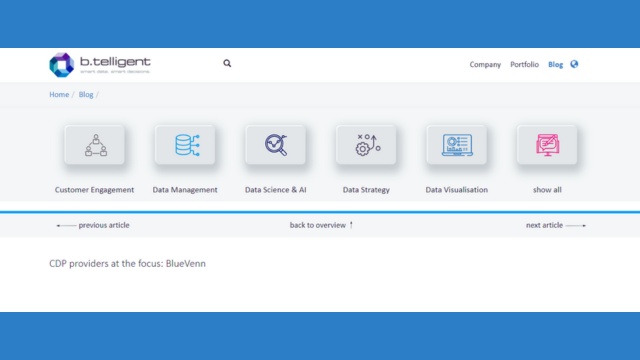
BlueVenn is a leading customer data platform (CDP) that empowers businesses to harness the full potential of their customer data. With its comprehensive suite of tools and features, BlueVenn offers several critical advantages to organizations striving to enhance their customer-centric strategies. Here are five pros of BlueVenn as one of the best CDPs:
Unified Customer Profiles:
BlueVenn provides a centralized hub for storing and managing customer data, enabling businesses to create detailed, 360-degree customer profiles. This consolidated view allows a deeper understanding of individual customer preferences and behaviours.
Advanced Analytics:
BlueVenn offers powerful analytical capabilities, enabling organizations to gain insights from their customer data. These insights help make data-driven decisions, optimize marketing strategies, and personalize customer experiences.
Seamless Data Integration:
BlueVenn integrates with various data sources, such as CRM systems, email marketing platforms, and e-commerce databases. This integration ensures businesses can efficiently access and use their data from one place.
Marketing Automation:
BlueVenn simplifies marketing operations through automation. It allows businesses to create and execute targeted marketing campaigns, improving customer engagement and increasing the efficiency of marketing efforts.
Compliance and Security:
BlueVenn strongly emphasizes data security and compliance. It adheres to industry standards and regulations, ensuring that customer data is handled with the utmost care, which is essential for maintaining trust and meeting legal requirements.
In summary, BlueVenn offers a robust CDP solution with unified customer profiles, advanced analytics, seamless data integration, marketing automation, and a focus on compliance and security. These advantages empower businesses to understand better and engage with their customers, driving success in today’s data-driven marketplace.
Pros:
1. BlueVenn offers robust customer data integration and centralized storage.
2. Its advanced analytics provide valuable insights for targeted marketing campaigns.
3. The platform supports real-time data updates, ensuring up-to-date customer profiles.
4. BlueVenn’s automation tools streamline marketing processes, improving efficiency.
Cons:
1. BlueVenn can be expensive for small businesses with limited budgets.
2. The learning curve may be steep, requiring time and training.
3. Customization options might be limited compared to other platforms.
4. Some users may find the user interface less intuitive than desired.
Buying Guide For the Best Customer Data Platform
Choosing the best Customer Data Platform (CDP) for your business is a critical decision that can significantly impact your customer relationships and overall success. To make an informed choice, you need to consider various factors. This article will guide you through the key considerations when selecting the ideal CDP for your organization.
Data Integration Capabilities
A fundamental factor to consider when choosing a CDP is its data integration capabilities. The CDP should seamlessly integrate with your existing systems and databases, such as CRM, email marketing platforms, e-commerce platforms, and more. Look for a CDP that supports various data sources and can process structured and unstructured data.
Data Quality and Cleansing
Data quality is crucial for accurate customer insights. The CDP should have built-in data cleansing and enrichment features to ensure your data is correct and up-to-date. It includes data deduplication, normalization, and validation, which can help prevent inaccuracies and inconsistencies in your customer data.
Data Storage and Scalability
Consider your data storage requirements and the platform’s scalability. Ensure that the CDP can handle the volume of data your organization generates and that it provides the flexibility to scale as your data needs grow. Cloud-based CDPs are often a good choice for scalability.
Customer Profiling and Segmentation
A strong CDP should enable you to create detailed customer profiles and segment your audience effectively. Look for features that allow you to define custom attributes and behaviour-based segments and target specific customer groups for personalized marketing campaigns.
Real-time Data Processing
In today’s fast-paced business environment, real-time data processing is critical. Your CDP should be capable of processing and analyzing data in real time, allowing you to respond to customer interactions and events as they happen.
Privacy and Data Security
Data privacy and security are paramount. Ensure the CDP complies with relevant data protection regulations and provides robust security features. Look for encryption, access controls, and auditing capabilities to safeguard customer data.
User-Friendly Interface
A user-friendly interface is essential for your team to utilize the CDP effectively. The platform should be intuitive, with a dashboard that allows easy access to customer data and insights. Training requirements for your staff should be minimal.
Analytics and Reporting
Comprehensive analytics and reporting capabilities are essential. Your CDP should provide insights into customer behaviour, preferences, and the effectiveness of your marketing efforts. Customizable reporting options are a plus.
Cross-Channel Marketing
Consider the CDP’s ability to support cross-channel marketing efforts. It should enable you to deliver consistent and personalized messaging across various communication channels, such as email, social media, SMS, and more.
Automation and Workflows
Look for automation features that can help streamline your marketing processes. Workflows and triggers should be customizable to automate tasks like sending personalized emails, updating customer records, etc.
Cost and ROI
Understand the CDP’s pricing structure and calculate the potential return on investment. Consider not only the initial costs but also ongoing maintenance and support fees. Evaluate the long-term value the CDP can provide to your organization.
Customer Support and Training
Choose a CDP vendor that offers excellent customer support and training resources. This will ensure that you can get assistance when needed and that your team can effectively use the platform to its full potential.
Vendor Reputation
Research the CDP vendor’s reputation and track record. Look for customer reviews, case studies, and testimonials to gauge the satisfaction of other organizations using the platform.
Customization and Extensibility
Consider the level of customization and extent of the CDP’s flexibility. Can it be tailored to your specific business needs, and does it support integrations with other third-party tools or services?
Data Ownership and Portability
Ensure you retain ownership of your customer data and can easily export it from the CDP if you switch to a different platform. Data portability is vital for data sovereignty and compliance.
Compliance and Regulations
Verify that the CDP complies with relevant data protection regulations, such as GDPR or CCPA. It should provide features to help you manage customer data by these laws.
Future-Proofing
Consider the future scalability and adaptability of the CDP. Will it accommodate emerging technologies and changing customer data needs in the future?
Trial and Testing
Before making a final decision, request a trial or demo of the CDP to assess its functionality and compatibility with your business processes. This hands-on experience can be invaluable in making the right choice.
Migration and Onboarding
Plan to migrate and onboard your existing customer data to the new CDP. Ensure that the vendor provides support and guidance for a smooth transition.
Feedback and Continuous Improvement
Finally, select a CDP vendor that values feedback and is committed to continuous improvement. This will ensure that the platform evolves to meet your business and market’s changing demands.
In conclusion, choosing the best Customer Data Platform for your organization is a complex decision that involves multiple factors. By carefully considering data integration, quality, privacy, usability, analytics, and other aspects, you can make an informed choice to empower your business to build stronger, more personalized customer relationships and drive growth. Remember that your business’s “best” CDP may be unique to your specific needs, so thorough evaluation is essential to find the perfect fit.
Frequently Asked Questions About Best Customer Data Platforms
In today’s data-driven business landscape, customer data is a valuable asset. Customer Data Platforms (CDPs) have emerged as essential tools for organizations looking to harness the power of this data to drive personalized marketing, enhance customer experiences, and make informed strategic decisions. As CDPs continue to evolve, it’s natural for businesses and individuals to have questions about these platforms. In this FAQ, we will address ten commonly asked questions about the best Customer Data Platforms, shedding light on what they are, their benefits, and how to choose the right one for your organization.
What is a Customer Data Platform (CDP)?
A Customer Data Platform is a software solution designed to collect, unify, and manage customer data from various sources, such as websites, mobile apps, CRM systems, etc. It provides a comprehensive view of each customer, allowing businesses to deliver personalized experiences and make data-driven decisions.
What distinguishes a CDP from other data management platforms?
CDPs are distinct from other data management platforms like Data Warehouses and Data Lakes because they are specifically built to handle customer data. They focus on unifying and organizing customer information, making it easily accessible for marketing, sales, and customer service teams.
What are the key benefits of using a CDP?
CDPs offer several benefits, including improved customer segmentation, enhanced personalization, more effective marketing campaigns, better customer insights, and the ability to comply with data privacy regulations. They help businesses streamline their data processes and improve customer engagement.
How does a CDP collect and store customer data securely?
CDPs collect data from various sources through APIs, batch imports, and real-time data streaming. They store this data securely and compliantly, often utilizing encryption and access controls to protect sensitive customer information.
Can a CDP integrate with other business systems and tools?
Yes, one of the strengths of a CDP is its ability to integrate with various business systems and marketing tools. It can connect with CRM systems, email marketing platforms, analytics tools, and more, ensuring that customer data is accessible where and when it’s needed.
What factors should you consider when choosing a CDP for your business?
When selecting a CDP, consider factors like data integration capabilities, scalability, security features, ease of use, and compliance with data regulations like GDPR and CCPA. Additionally, evaluate the vendor’s reputation and customer support.
How can a CDP help with marketing efforts?
CDPs empower marketing teams by providing a 360-degree view of customer data. It enables more targeted and personalized marketing campaigns, leading to higher conversion rates and improved customer loyalty.
What role does data privacy play in CDP implementation?
Data privacy is of paramount importance in CDP implementation. Businesses must ensure that the CDP they choose complies with data protection regulations and establish data governance practices to safeguard customer information.
What is the cost associated with implementing a CDP?
The cost of a CDP varies depending on the vendor, the features required, and the organization’s size. Typically, businesses can choose from various pricing models, such as subscription-based, usage-based, or custom pricing tailored to their needs.
Can small businesses benefit from using a CDP, or is it primarily for larger enterprises?
CDPs are not exclusive to large enterprises. Small businesses can also benefit from CDPs, mainly if they rely on customer data to drive their marketing and sales efforts. CDP solutions cater to businesses of all sizes, making them accessible to various organizations.
In conclusion, Customer Data Platforms are instrumental in effectively managing and leveraging customer data. They offer many benefits, from improved marketing efforts to enhanced customer experiences. When considering a CDP for your organization, consider the factors that matter most to your business, including data security, integration capabilities, compliance, and overall cost. Regardless of your business’s size, a well-chosen CDP can provide a competitive advantage in today’s data-centric business world.
Final Thoughts
The realm of customer data platforms (CDPs) has evolved dramatically, ushering in a new era of customer-centric business strategies. Today’s dynamic market landscape demands agile and effective tools for collecting, organizing, and utilizing customer data. As we’ve explored the nuances of CDPs, it becomes abundantly clear that these platforms serve as invaluable assets for businesses looking to thrive in the age of data-driven decision-making.
One key advantage of CDPs is their ability to centralize and unify customer data from many touchpoints and channels. By actively collating information, CDPs empower organizations to develop a comprehensive and real-time understanding of their customers, ensuring personalized and meaningful interactions. This active approach to data management is a fundamental shift away from passive, disparate data storage methods, where insights often remain buried and underutilized.
Moreover, CDPs are more than just repositories; they are the linchpins in creating seamless customer experiences. Their active role in data activation enables businesses to deliver targeted content, anticipate customer needs, and optimize real-time marketing efforts. This proactive approach fosters loyalty, increases customer engagement, and drives revenue growth.
Furthermore:
In an era marked by heightened data privacy concerns, CDPs also actively contribute to compliance by offering robust security measures and adhering to regulatory requirements. Businesses can rest assured that their customer data is safeguarded, bolstering trust and their reputation in an age of data breaches.
- Salesforce Customer 360 unifies customer data for seamless interactions and insights.
- Adobe Real-Time CDP empowers real-time customer experiences through data-driven insights.
- Segment streamlines data collection and personalization for enhanced customer engagement.
As CDP technology continues to evolve, it’s clear that businesses must actively adapt and harness the power of these platforms to thrive in the competitive market. The active voice of CDPs is resounding in transforming businesses into agile, customer-centric entities that seek to understand and engage with their clientele, ultimately ensuring success and sustainability in the ever-evolving marketplace.
Next Article: BEST Screen Sharing Software Solutions

